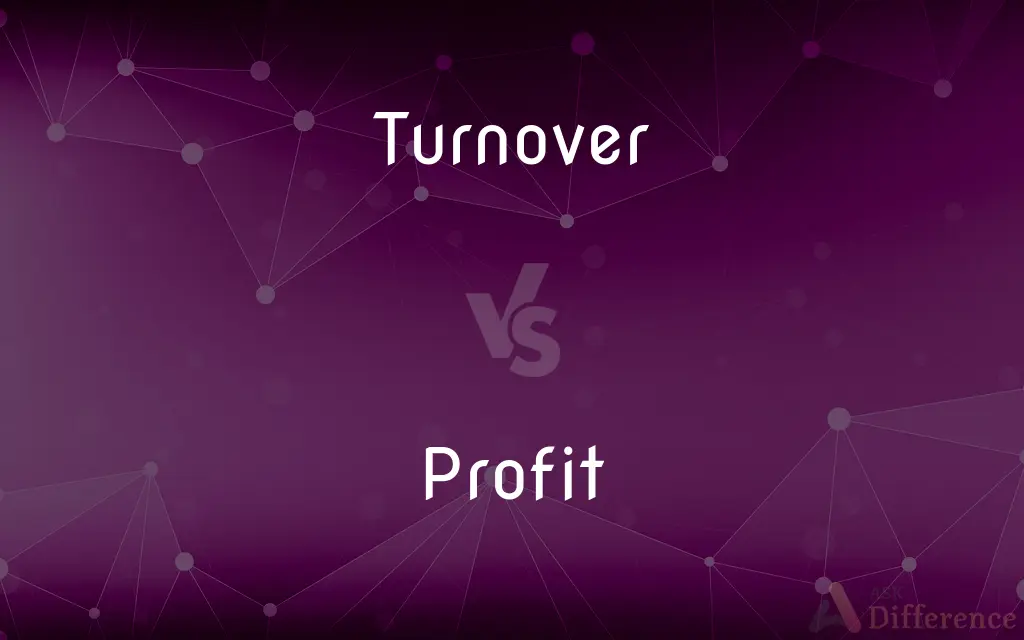Turnover vs. Profit — What's the Difference?
By Fiza Rafique & Urooj Arif — Updated on May 16, 2024
Turnover refers to the total revenue generated from sales, while profit is the financial gain after subtracting all expenses from revenue.

Difference Between Turnover and Profit
Table of Contents
ADVERTISEMENT
Key Differences
Turnover, often referred to as sales or revenue, is the total amount of money a company earns from its core business activities over a specific period. It reflects the volume of business conducted and is a crucial metric for assessing a company’s market performance and operational scale. Profit, on the other hand, represents the financial gain remaining after all expenses, including cost of goods sold (COGS), operating expenses, taxes, and other costs, are subtracted from turnover. Profit is a measure of the company’s efficiency in managing its operations and expenses.
Turnover gives a top-line view of a company’s income, while profit provides a bottom-line measure of financial success. A company can have high turnover but low profit if its costs are high, whereas a company with lower turnover can achieve high profit if it manages its expenses effectively.
Turnover is crucial for understanding the scale and reach of a business, and profit is vital for evaluating its sustainability and ability to generate value for shareholders.
Comparison Chart
Definition
Total revenue from sales
Financial gain after expenses are deducted
Focus
Volume of sales or revenue
Financial efficiency and profitability
ADVERTISEMENT
Measurement
Gross income from business activities
Income remaining after all costs
Importance
Indicates market performance and business scale
Reflects financial health and sustainability
Calculation
Sum of all sales revenue
Turnover minus COGS, operating expenses, taxes
Example
$1 million in sales revenue
$200,000 net profit after expenses
Compare with Definitions
Turnover
Total revenue generated from sales of goods or services.
The company's turnover for the year was $5 million.
Profit
Financial gain after all expenses are deducted from revenue.
After deducting costs, the company's profit was $500,000.
Turnover
The total amount of money received from business operations.
High turnover indicated strong demand for their products.
Profit
Net income remaining after all costs.
The bakery's profit margins increased with better cost management.
Turnover
The gross income before any deductions.
The store's turnover increased during the holiday season.
Profit
An advantageous gain or return; benefit.
Turnover
Sum of all sales revenue.
With a turnover of $3 million, the firm expanded its operations.
Profit
Financial gain from a transaction or from a period of investment or business activity, usually calculated as income in excess of costs or as the final value of an asset in excess of its initial value.
Turnover
The amount of money taken by a business in a particular period
A turnover approaching £4 million
Profit
To make a gain or profit.
Turnover
The rate at which employees leave a workforce and are replaced
High staff turnover left the program with too many young instructors
An annual turnover of staff as high as 100%
Profit
To derive advantage; benefit
Profiting from the other team's mistakes.
Turnover
A small pie made by folding a piece of pastry over on itself to enclose a sweet filling
An apple turnover
Profit
To be beneficial to
What has all this time in school profited you?.
Turnover
(in a game) a loss of possession of the ball to the opposing team
The team were sitting on their lead and taking care to avoid turnovers
Profit
Total income or cash flow minus expenditures. The money or other benefit a non-governmental organization or individual receives in exchange for products and services sold at an advertised price.
Turnover
The act or fact of turning over
Preventing the turnover of vehicles in accidents.
Profit
Benefit, positive result obtained.
Reading such an enlightening book on the subject was of much profit to his studies.
Turnover
An abrupt change or transfer, as of power or ownership.
Profit
Senseid|en|interest in land}} (property law) {{ellipsis of profit à prendre
Turnover
A small pastry made by covering one half of a piece of dough with a filling, folding the other half over on top, and sealing the edges.
Profit
(transitive) To benefit (somebody), be of use to (somebody).
Turnover
The number of times a particular stock of goods is sold and restocked during a given period of time.
Profit
To benefit, gain.
Turnover
The amount of business transacted during a given period of time.
Profit
To take advantage of, exploit, use.
Turnover
The number of shares of stock sold on the market during a given period of time.
Profit
Acquisition beyond expenditure; excess of value received for producing, keeping, or selling, over cost; hence, pecuniary gain in any transaction or occupation; emolument; as, a profit on the sale of goods.
Let no man anticipate uncertain profits.
Turnover
The number of things that are replaced by others of the same kind, or the rate at which this happens
The turnover of red blood cells.
A rapid turnover of hospital patients.
Profit
Accession of good; valuable results; useful consequences; benefit; avail; gain; as, an office of profit,
This I speak for your own profit.
If you dare do yourself a profit and a right.
Turnover
The number of workers that have left a workplace or industry and been replaced in a given period of time, or the rate at which this happens.
Profit
To be of service to; to be good to; to help on; to benefit; to advantage; to avail; to aid; as, truth profits all men.
The word preached did not profit them.
It is a great means of profiting yourself, to copy diligently excellent pieces and beautiful designs.
Turnover
The ratio of this number to the number of employed workers in a workplace.
Profit
To gain advantage; to make improvement; to improve; to gain; to advance.
I profit not by thy talk.
Turnover
(Sports) A loss of possession of the ball or puck to the opposing team, as by a misplay or an infraction of the rules.
Profit
To be of use or advantage; to do or bring good.
Riches profit not in the day of wrath.
Turnover
Capable of being turned or folded down or over
A turnover collar.
Profit
The excess of revenues over outlays in a given period of time (including depreciation and other non-cash expenses)
Turnover
The amount of money taken as sales transacted in a given period.
The company had an annual turnover of $500,000.
Profit
The advantageous quality of being beneficial
Turnover
The frequency with which stock is replaced after being used or sold, workers leave and are replaced, a property changes hands, etc.
High staff-turnover can lead to low morale amongst employees
Those apartments have a high turnover because they are so close to the railroad tracks.
Profit
Derive a benefit from;
She profited from his vast experience
Turnover
A semicircular pastry made by turning one half of a circular crust over the other, enclosing the filling (usually fruit).
They only served me one apple turnover for breakfast.
Profit
Make a profit; gain money or materially;
The company has not profited from the merger
I lost thousands of dollars on that bad investment!
The company turned a loss after the first year
Turnover
(sports) A loss of possession of the ball without scoring.
The Nimrods committed another dismaying turnover en route to another humiliating loss.
Profit
Indicator of financial health and efficiency.
High profits allowed the business to invest in new technology.
Turnover
A measure of leg speed: the frequency with which one takes strides when running, typically given in strides per minute.
Profit
The surplus after all operating expenses, taxes, and other costs.
The profit from the new product line exceeded expectations.
Turnover
The act or result of overturning something; an upset.
A bad turnover in a carriage
Profit
The bottom-line earnings.
The company's quarterly profit was reported at $1.2 million.
Turnover
(dated) An apprentice, in any trade, who is handed over from one master to another to complete his time.
Turnover
Capable of being turned over; designed to be turned over.
A turnover collar
Turnover
The act or result of turning over; an upset; as, a bad turnover in a carriage.
Turnover
A semicircular pie or tart made by turning one half of a circular crust over the other, inclosing the fruit or other materials; as, an apple turnover.
Turnover
An apprentice, in any trade, who is handed over from one master to another to complete his time.
Turnover
Admitting of being turned over; made to be turned over; as, a turnover collar, etc.
Turnover
The ratio of the number of workers that had to be replaced in a given time period to the average number of workers
Turnover
Made by folding a piece of pastry over a filling
Turnover
The volume measured in dollars;
The store's dollar volume continues to rise
Turnover
The act of upsetting something;
He was badly bruised by the upset of his sled at a high speed
Turnover
Measure of business activity volume.
The fast turnover in the restaurant led to a busy kitchen.
Common Curiosities
What is turnover in business?
Turnover refers to the total revenue generated from sales of goods or services over a specific period.
What is profit in business?
Profit is the financial gain remaining after all expenses, including costs of goods sold, operating expenses, and taxes, are subtracted from turnover.
How is turnover calculated?
Turnover is calculated by summing up all sales revenue from business activities.
How is profit calculated?
Profit is calculated by subtracting all expenses from the total revenue (turnover).
Why is profit important?
Profit is important as it measures the company’s financial health, efficiency, and ability to generate value for shareholders.
Can turnover be used to assess a company's performance?
Yes, turnover can help assess the company's sales performance and market reach, but it doesn't indicate profitability.
What is gross profit?
Gross profit is turnover minus the cost of goods sold (COGS), reflecting the profit made before operating expenses.
What does a high profit margin indicate?
A high profit margin indicates that a company is managing its expenses effectively relative to its turnover.
Can a company have high turnover but low profit?
Yes, if the company's expenses are high, it can have high turnover but low profit.
Why is turnover important?
Turnover is important because it indicates the scale of a company’s business activities and market performance.
What is net profit?
Net profit is the remaining income after all expenses, including operating costs, taxes, and interest, have been deducted from total revenue.
How can a company increase its profit?
A company can increase profit by reducing costs, increasing prices, improving efficiency, or expanding sales.
Is profit the same as cash flow?
No, profit is the financial gain after expenses, while cash flow refers to the actual movement of cash in and out of the business.
How can a company increase its turnover?
A company can increase turnover by boosting sales through marketing, expanding product lines, or entering new markets.
What is operating profit?
Operating profit is the profit earned from a company's core business operations, excluding taxes and interest expenses.
Share Your Discovery

Previous Comparison
Astronaut vs. Spaceman
Next Comparison
Arc vs. ArkAuthor Spotlight
Written by
Fiza RafiqueFiza Rafique is a skilled content writer at AskDifference.com, where she meticulously refines and enhances written pieces. Drawing from her vast editorial expertise, Fiza ensures clarity, accuracy, and precision in every article. Passionate about language, she continually seeks to elevate the quality of content for readers worldwide.
Co-written by
Urooj ArifUrooj is a skilled content writer at Ask Difference, known for her exceptional ability to simplify complex topics into engaging and informative content. With a passion for research and a flair for clear, concise writing, she consistently delivers articles that resonate with our diverse audience.












































